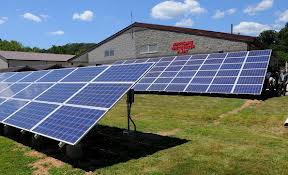With West Virginia reeling from the chemical spill and a commitment
to coal that’s been harming peoples’ health and the environment in exchange for
jobs, perhaps it’s finally time for them to look into the solar industry, which
is generating thousands of jobs in nearby states.
“We look at the significant growth taking place in states like Ohio,
Pennsylvania, and Maryland, which can be attributed to supportive public
policies, and wonder why West Virginia hasn’t taken advantage of this enormous
opportunity,” says Jeff Simcoe, Energy Program Project Manager at
Downstream Strategies. “We found that there were close to 9,000 jobs
associated with the solar industry across those three neighboring states, while
West Virginia ranked 51st in total solar jobs per capita, at just under 100
jobs.”
Indeed, even though While West Virginia has favorable solar resources, it
is vastly underutilized there because of the lack of
supportive state policies. As of 2012, West Virginia lags the country
in installed solar capacity with a very meager 2 megwatts.
Clearly, the strong grip the coal industry is holding the state back on solar
(and wind) in addition to the lack of life-saving regulations that could
have prevented the chemical release.
But solar doesn’t have to compete with coal, it can add diversity to the
state’s energy sources (where there’s also natural gas).
Solar at a wastewater plant in West Virginia:

Downstream Strategies and The Mountain Institute released the
report, “Using Solar PV to Create Economic Opportunity and Energy
Diversity,” which details how West Virginia can join neighboring states in
creating well-paid, local solar jobs.
The report’s five specific recommendations would help
reduce up-front costs of solar PV equipment; improve market access for solar
energy; and provide incentives to help residents, businesses, and non-profits
to use solar.
1. Implement a mandatory Renewable Portfolio Standard with a
Solar Carve Out – a specific percentage required for solar
2. Provide tax incentives for individuals and businesses to
install solar
3. Third Party Financing would benefit non-profit and local
government solar projects
4. Expand net metering to allow virtual net metering for offsite
solar projects
5. Consider policy options such as a Feed In Tariff and
Time of Use pricing
“These policies would help level the playing field for solar and
address barriers that prevent West Virginia from establishing an economically
viable solar industry," the authors say.
Here’s the report:

